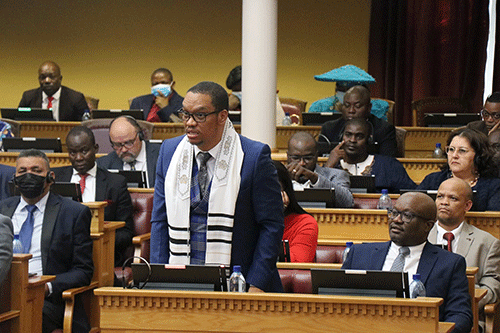The matter in which Landless People’s Movement leader Bernadus Swartbooi is challenging the decisions taken after he and fellow party leader Henny Seibeb’s infamous conduct in parliament during a presidential address, will be heard by a full bench of High Court judges.
Yesterday, judge Thomas Masuku said the merits of the matter required to be heard before a full bench of judges. Thus, in consultation with judge president Petrus Damaseb, judges will in due course be appointed to adjudicate.
The case has since been postponed to 13 April.
Swartbooi and Seibeb brought the joint sitting of parliament to a standstill on 15 April 2021 while President Hage Geingob was delivering his annual state of the nation address (Sona).
The pair caused several disruptions and got embroiled in a shouting match, which eventually ended in their removal and the adjournment of the session.
Swartbooi also knocked off the ceremonial mace from its stand, while Seibeb was led out of the door by Geingob’s security and his suit being torn in the melee. The sitting was then adjourned and in May, the High Court dismissed, with costs, a case in which the two parliamentarians were challenging the decision by Speaker Peter Katjavivi to bar them from attending parliament.
However, the Supreme Court in August 2021 ruled that Katjavivi’s decision to suspend Swartbooi and Seibeb from parliament was unlawful.
In the current suit, Swartbooi is seeking an order which will review and set aside the decision of the Rules Committee purportedly taken on 21 April 2021 to refer their matter to the Privileges Committee, who then took the decision to investigate their conduct.
He also wants the court to set aside and declare the decision of the National Assembly to adopt the findings of a report from the privileges committee titled “Investigation into the conduct of Hon. Bernadus Swartbooi and Hon. Henny Seibeb on 15 April 2021 during the state of the Nation Address”, null and void.
The LPM leader furthermore wants certain sections of the Standing Rules and Orders and Internal Arrangements of the National Assembly, declared unconstitutional.
These sections deal with the restrictions of the courts to determine whether the actions and decisions of the National Assembly and its Committees are lawful or not.
-mamakali@nepc.com.na



